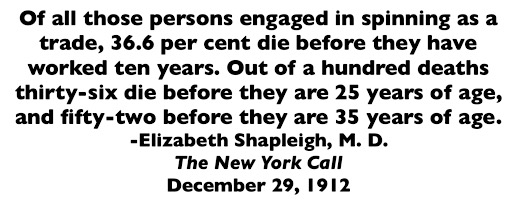 —————
—————
From The American Magazine of December 1911:
Judy Collins – Bread and Roses – Judy Collins
Lyrics by James Oppenheim
 —————
—————
Judy Collins – Bread and Roses – Judy Collins
Lyrics by James Oppenheim
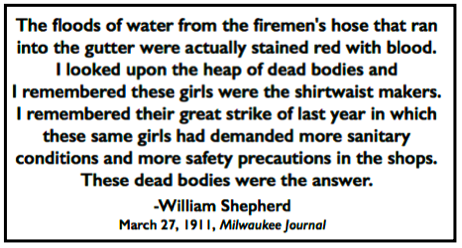 ———————-
———————-
Hellraisers Journal – Friday December 29, 1911
Survivors of the Triangle Shirtwaist Factory Fire Testified at Trial
From The Pensacola Journal of December 17, 1911:
From the New York Tribune of December 19, 1911:
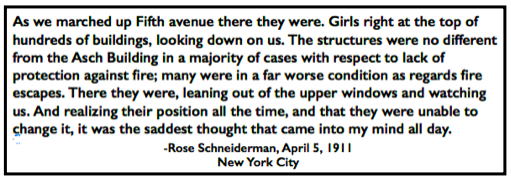 ———-
———-
Hellraisers Journal – Thursday May 4, 1911
Louis Duchez on Murder of Shirtwaist Makers in New York City, Part II
From the International Socialist Review of May 1911:
THE MURDER OF THE SHIRT WAIST MAKERS
IN NEW YORK CITYBY LOUIS DUCHEZ
Photographs by American Press Ass’n.
[Part II of II.]
Violations of the law? Yes, enough to hang half a dozen rich exploiters and politicians. But these men won’t hang.
The owner of the building claimed he lived up to the letter of the law. So did the owners of the shirtwaist concern, Blanck and Harris. They blame the city officials. The State Commission of Labor also blames the city officials. On the other hand, the city officials are hunting for someone to point to. One of these gentlemen divides the guilt between God and the “public conscience.”
The more important facts, however, are as follows: While the holocaust was taking place the superintendent of public buildings, Rudolph P. Miller, was on a pleasure trip to Panama. Under questioning conducted by Fire Marshal Beers he admitted that the Asch building, in which the fire took place, had not been inspected since it was built, ten years ago. He said he was not even sure that he passed on the building before it was occupied. Miller is not an architect; he is simply a civil engineer-with a “pull.” In his testimony he also admitted that he knew of “graft” from building owners being accepted by inspectors. Miller blamed the police department.
According to the state law, “fire-proof” buildings need not put up more than one fire escape. And that’s all the Asch building had. And this one was useless. When the flames heated the flimsy iron work. it bent like wire. Besides, the scaling ladders were not fit to use and the extension ladders reached only to the 6th floor. The hose, too, was rotten, and the fire apparatus was only so in name. Then iron shutters blocked the fire escape, such as it was.
The locked doors have been mentioned. There was no fire escape to the roof. The machines were so closely packed together, in order to save space. that a panic resulted when the fire first started. Large piles of combustible goods obstructed every aisle and opening, also, if the building and conditions had been deliberately planned for the cremation of human beings, it could not have been more perfect.
To look at the Asch building since the fire one could not tell from the outside that anything had happened to it, were it not for the broken windows. As a matter of fact, the damage only reached $5,000. Everything was insured-but the slaves.
 ———-
———-
Hellraisers Journal – Saturday April 8, 1911
Women March in Cold Rain for Unidentified Victims of Triangle Fire
From the New York Tribune of April 6, 1911:
There was majestic silence and sullen rain. But it was a silence that spoke. Their fellow workers to the number 145 had been launched into eternity as the result of the Asch Building fire on March 25. And so [thousands] marched in murmurless protest through the principal streets of the city yesterday.
The steady downpour did not divert girls who were without umbrellas, without hats, without overshoes and rubber coats from their determination to show public honor to fellow workers who had perished…..
If the day had been filled with sunshine the funeral procession would have been impressive. Perhaps, however, there would then have been the chance to minimize the intensity of feeling existing among the marching members of the sympathizing unions. Only a high devotion and sense of duty could be responsible for yesterday’s protest.
Low hanging clouds and fog shrouded the tops of buildings. The Metropolitan tower was invisible above its clock. There was the suggestion of smoke in the atmosphere. The streets were filled with puddles of water. Women in lamb’s wool coats, accustomed to ride in automobiles, were splashed by passing vehicles as they trudged along in the beating rain, anxious to demonstrate the sympathy felt by the Woman Suffrage party. Hundreds of thousands stood on the sidewalks, their umbrellas appropriately indicating unbroken borders of black. Policemen, mounted and afoot, wore regulation black raincoats.
There was no playing of plaintive music, no muffled drum beat. The spectacle was without ostentation, flourish or display. Banners bore the legend “We mourn our loss” in black and white. There was a solemn expression on the faces of those who marched and those who watched from office buildings, stores and private houses. Flags on public buildings were at half-mast; thousands of other structures were draped in funeral decorations.
 —————-
—————-
Hellraisers Journal – Friday April 7, 1911
New York City – 100,000 Parade in Tribute to the Unidentified Dead
From the New York Evening World of April 5, 1911:
The funeral of the unidentified victims of the Washington place disaster this afternoon was made memorable by parades of mourning in which probably 100,000 members of labor unions took part in Manhattan, and 5,000 in Brownsville and East New York. Owing to the confusion attending the formation of the Manhattan parade it was late in starting. Once it got under way business generally came to a halt in the district between Washington Square and Thirty-fourth street in and adjacent to Fifth avenue….
The great massing of men and women preparatory to the start of the parade, the many mourning emblems, the evident depth of the sorrow of the marchers, the silent determination of the moving throngs would have been impressive enough on a bright, cheerful New York spring day. In the gloom of fog, with a misty rain falling and the streets sticky and slippery, the slowly passing columns, sombre in black garments and partially concealed from the view of those above by black, shining umbrellas, took on a sullen aspect almost awe-inspiring…..
[Emphasis added.]
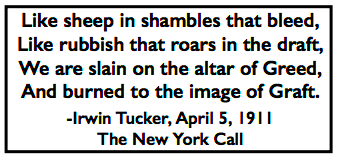 —————
—————
Hellraisers Journal – Thursday April 6, 1911
New York, New York – “The Sacrifice” by Irwin Tucker and Gordon Nye
From The New York Call of April 5, 1911:
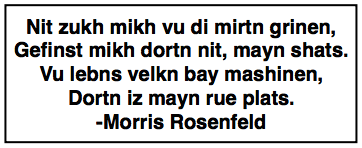 —————
—————
Hellraisers Journal – Monday April 3, 1911
International Ladies’ Garment Workers’ Union in Mourning
From The Ladies Garment Worker of April 1911:
When ready to go to press we learn of the awful calamity at the Triangle Waist Company. While most of the garment manufacturing establishments in New York City are not any better as far as fire protection is concerned, it is significant that the worst calamity happened at the Triangle, known among the workpeople in the trade as the “prison.” The name is probably due the extraordinary discipline with poor earning for which the firm is famous.
It is not strange that in this most democratic of all countries in the world the employers can so easily use the arm of the law to protect themselves against any inconveniences which their workpeople may cause them, but the law is nowhere when the life and limb of the worker is to be protected.
The writer of these lines, when approaching the factory some two years ago in an attempt to organize the workpeople of that firm, was pounced upon by two plain clothed policemen and taken to the police cell. No one, however, knows whom to blame for this calamity.
It is evident that the worker can expect next to nothing in the way of protection from the legal authorities. Whether it is the Supreme Court or the good people who are interested in the architectural beauties of the city, nothing will be done until the workers will begin in earnest to attend to their own business. They must declare a strike at all such fire traps until adequate protection is provided.
Pickets should be posted at the entrance of such places with sign boards bearing the following inscription: Please do not go to work in this place until proper fire protection is provided for the workpeople.
Let the authorities find our action contrary to the Sherman Anti-Trust Laws or any other of the innumerable laws provide to safeguard the interest of the capitalists, and which the authorities are ever ready to guard jealousy. We will cheerfully go to prison but there will be no more fire traps. Such a strike will put an end to such a state of things within 48 hours.
———-
There are in the same building a number of cloak shops, who before the general strike, worked until 6 o’clock on Saturdays. Thanks to the change in hours all these left at 1 o’clock, otherwise the victims would have been more numerous.
[Emphasis added.]
 —————
—————
Hellraisers Journal – Tuesday March 28, 1911
“How Long Will the Workers Permit Themselves
to Be Burned as Well as Enslaved in Their Shops?”
From The New York Call of March 27, 1911:
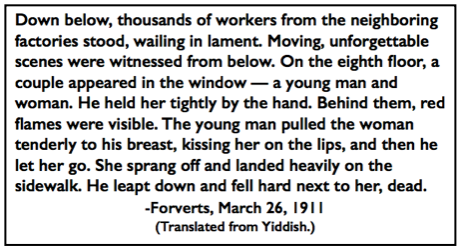 —————
—————
Hellraisers Journal – Monday March 27, 1911
New York City – Mothers Sob and Keen for Blocks Around Site of Tragic Fire
From Forverts of March 26, 1911
-“The Entire Jewish Quarter Is In Grief”